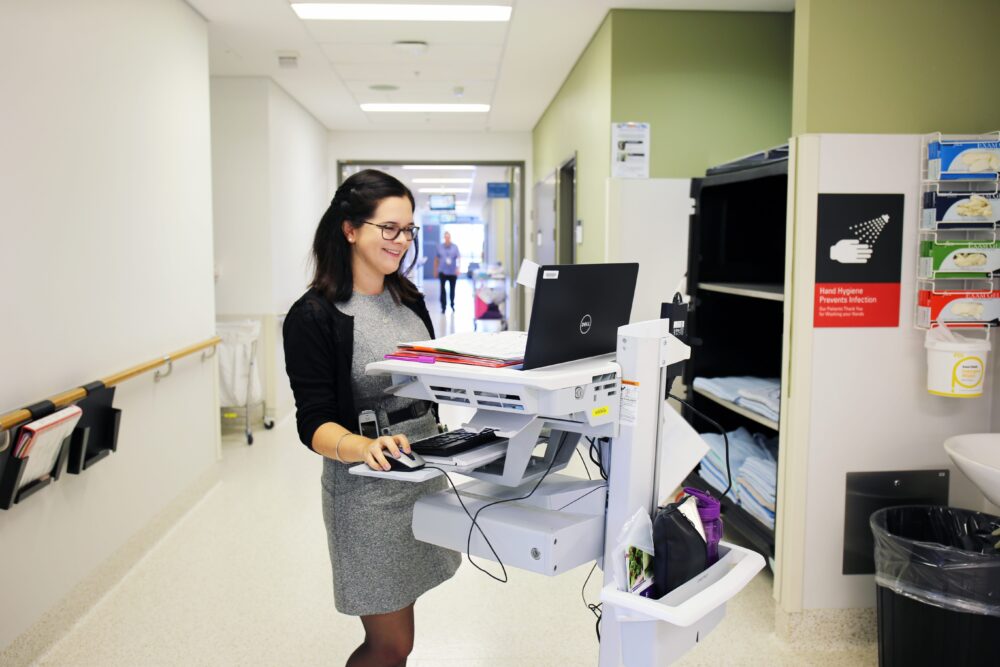We recently spoke with remarkable graduate Rebecca Curran, a Clinical Pharmacist for Gold Coast Health who has been employed at the Gold Coast University Hospital for four years. Discussing her journey through the Bachelor of Pharmaceutical Science, into the Master of Pharmacy (Honours) and onto a fantastic career in hospital pharmacy Rebecca discussed the challenges, necessary support and the myths of university.
“I picked the Bachelor of Pharmaceutical Science because it gave me three years of studying as a base,” she says, “Then I could choose to go into the Master of Pharmacy or into something different. I really enjoyed Chemistry in High School and I did a Pharmacy work shop when I was in high school as part of The Siemens Science Experience.” When it came to graduating her undergraduate, Rebecca knew she wasn’t the right person for community pharmacy and decided to join some of her close-knit cohort in the Master of Pharmacy with the aim towards hospital pharmacy. “I worked on a research project,” she explains, “and did my first hospital placement and I really enjoyed the immediate intervention capability you have when you work with patients, you’re able to prevent future medication issues.”

Helping to prevent, where possible, patients needing to come back to the hospital due to medication mismanagement and working with the other health professionals to further increase their knowledge of medications is one aspect of hospital pharmacy that Rebecca feels makes a positive change to the health industry. “We’re seeing the increase of pharmacists on-ward,” she says, “With a pharmacist on every ward we’re able to prevent medication issues, which is a big deal. You’ll see patients coming into hospital and the hospital staff receive a full list of the medications they’re taking, which prevents delays in treatment or incorrect medication potentially being administered.”
Rebecca’s passion for her industry, and hospital pharmacy in particular, is apparent. In the time we toured the hospital with her she continues to work and greet people, talking animatedly about one of the things she wishes was clearer for people looking to study. “The degree is not the career you’re going into,” she says, “It’s the base knowledge and the skills that you then use in your job. You can love your degree, and I did, but whether you’re willing to find what makes you happy in your field is another thing. I realised that if I wanted to do pharmacy I wanted to do hospital pharmacy, some research and teaching and I found a way to pursue that.”
Rebecca gives lectures at the School of Pharmacy each year, which came about aftersharing her interest in educating. There are multiple ways to apply a pharmacy degree though, with some of her peers having moved into the police force, pharmaceutical companies and corporations. One thing that remains a constant though is the misunderstanding that pharmacists just ‘put labels on boxes’. “There is a lack of understanding around the clinical review process, around the need to ensure that different medications won’t harm the patient if taken together and that they’re receiving the best treatments possible. A lot of people get impatient because they think we’re just sticking labels, but what we’re doing is intended to keep you safe and communicating relevant medication information.”
Talking about her journey with Griffith, Rebecca attributes some of her success to the foundation she gained in the Griffith Honours College. “To go from being a part of a high school community to the wider world of university, the Honours College was a home,” she explains, “I made friends through the Honours College I wouldn’t have known otherwise. I just visited a friend at the University of Oxford that studied law at Griffith. We met through Honours College and attended the International Youth Leadership Conference in Prague together and to have friends in other areas you can talk to is an amazing support network.”
Combating the initial fear of getting a job out of university was one of the more challenging moments Rebecca faced. “Every student has that fear,” she says, “And pharmacy is one of the degrees where you have to do a graduate year after your degree and there’s a possibility that you might not end up in the stream of industry that you’re focused on.” Due to the competitive nature of graduate positions Rebecca knew that the more diverse her resume was, the better chance she had of getting the graduate placement that was right for her. “Doing the Master of Pharmacy (Honours) and being a part of the Honours College helped me overcome the challenge of getting the right job and helped me differentiate,” she says, “Once you have the job it’s just a matter of working hard and making the right impression.”
Rebecca is a member of the scientific committee for the Medicines Management Conference for The Society of Hospital Pharmacists of Australia this year and she’s excited to see the advocacy of pharmacists to have more clinical roles and further expanded roles. She also hopes to move further into an educational role in the future, but is currently enjoying contributing the advancement of hospital pharmacy. “I just want to make a difference,” she says, “At the end of the day I just want to make a difference to my patients lives.”



